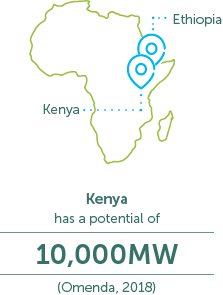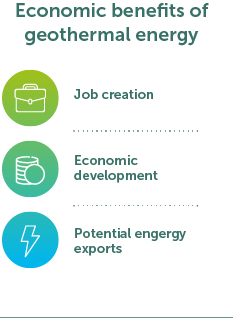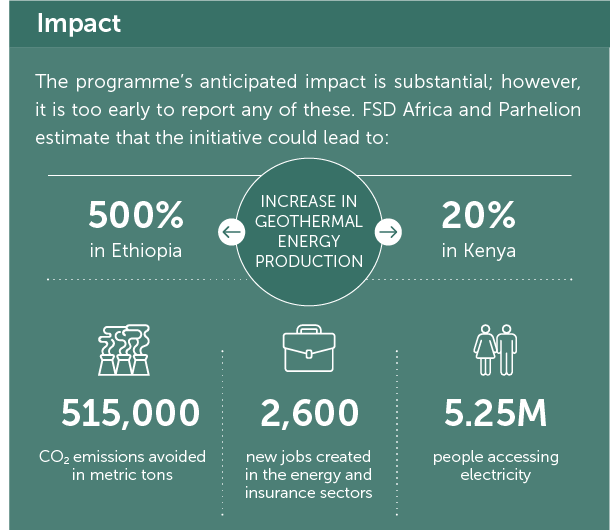
The potential of Geothermal energy in Kenya and Ethiopia
Geothermal energy is a consistenly available renewable and clean power source. The East African Rift System, one of the world’s largest rifts, boasts an estimated 20,000MW geothermal potential.

Kenya is already a global leader in geothermal energy, with approximately 950MW of installed geothermal capacity, aligning with its target of achieving 100% renewable energy by 2030

Ethiopia
Ethiopiais, in the early stages of geothermal generation, has enormous potential for green energy production, including geothermal, hydro, wind, and solar energy.

“In the local market, nobody is
going to participate in a risk that they have no data for, or where they have no expertise. That is not insurance, it’s gambling. But by bringing expertise from abroad, we can learn. We can understand the risk. It’s opening a door for us
to underwrite the risk properly and price it correctly.”
Dillawar Sharma
Unit Underwriting Manager,
GA Insurance Limited
“Establishing a risk underwriting facility of domestic and African insurers for joint risk transfer is important as this is a new product for underwriters in Kenya, requiring technical expertise and capabilities. The joint risk transfer will assist with sharing the relevant skills, expertise and capabilities, economies of scale as well as the distribution of the risk.”
Philip Lopokoiyit
CEA and Principal Officer,
ICEA LION Group
With the vast geothermal potential in the region, East Africa can become a leading player in clean and sustainable energy production.
FSD Africa has launched a groundbreaking programme aimed at
de-risking and facilitating early-stage development of geothermal energy projects in Kenya and Ethiopia. Partnering with Parhelion, a UK-based energy and climate risk finance company, FSD Africa is working to underwrite geothermal project development and enable local insurers to develop insurance products that attract investment into the region’s geothermal energy projects.
Geothermal Risk Transfer Facility: To overcome the challenges associated with high upfront costs and the risks involved in geothermal drilling, FSD Africa is introducing a Geothermal Risk Transfer facility. This facility aims to mitigate the risks of drilling unviable wells and low production, making geothermal exploration more attractive and providing easier access to investment. Development finance institutions often hesitate to take on the uncertainties of drilling, but with insurance serving as a backstop, they can be assured of repayment and lend support.
Geothermal Resource Risk Insurance Training Programme:
FSD Africa and Parhelion have launched a capacity development programme in Kenya and Ethiopia, partnering with Kenbright, an insurer and financial services firm, to train African insurers. The training includes site visits to geothermal drilling sites, risk assessment, parametric insurance, and underwriting practice specific to geothermal drilling and development risk cover. The programme creates a significant market opportunity by retaining premiums within the local market instead of being channelled to international counterparts. To date, ten leading insurers have taken part in this training, including ICEA LION Group and GA Insurance Limited.
New partnerships: The programme has also fostered fruitful partnerships between local insurers and industry experts, facilitating collaboration and knowledge exchange. GA Insurance, in particular, was greatly impressed by the expertise brought in through the training, especially in parametric insurance, enabling the company to offer unique and tailored solutions to clients in Kenya. As a result, the company plans to launch the geothermal risk insurance product within the next year or two.
On a broader scale, establishing a risk underwriting facility of
domestic and African insurers for joint risk transfer of geothermal risks is vital to introducing a new product for underwriters in Kenya. By sharing skills, expertise, and risks through the Geothermal Resource Risk Insurance Training Programme, domestic insurers gain essential knowledge and improved skill sets in this emerging risk area.

By tapping into the abundant geothermal energy potential in East Africa, countries in the region can reduce their dependence on carbon-emitting or climate-vulnerable power sources and bring affordable and sustainable green energy to millions still without electricity. The success of this programme would also pave the way for applying similar principles to other renewable energy projects, further advancing Africa’s clean energy transition and geared towards achieving net-zero by 2050.
In conclusion, FSD Africa and Parhelion’s initiative is a groundbreaking effort that addresses the challenges associated with drilling costs and risks. By providing insurance and building the capacity of local insurers, the programme aims to attract investment, promote renewable energy, and foster economic growth. With the vast geothermal potential in the region, East Africa can become a leading player in clean and sustainable energy production.
